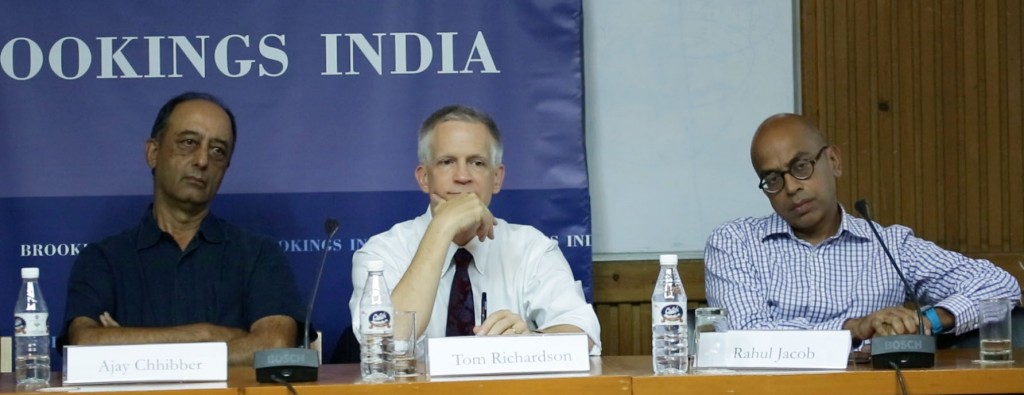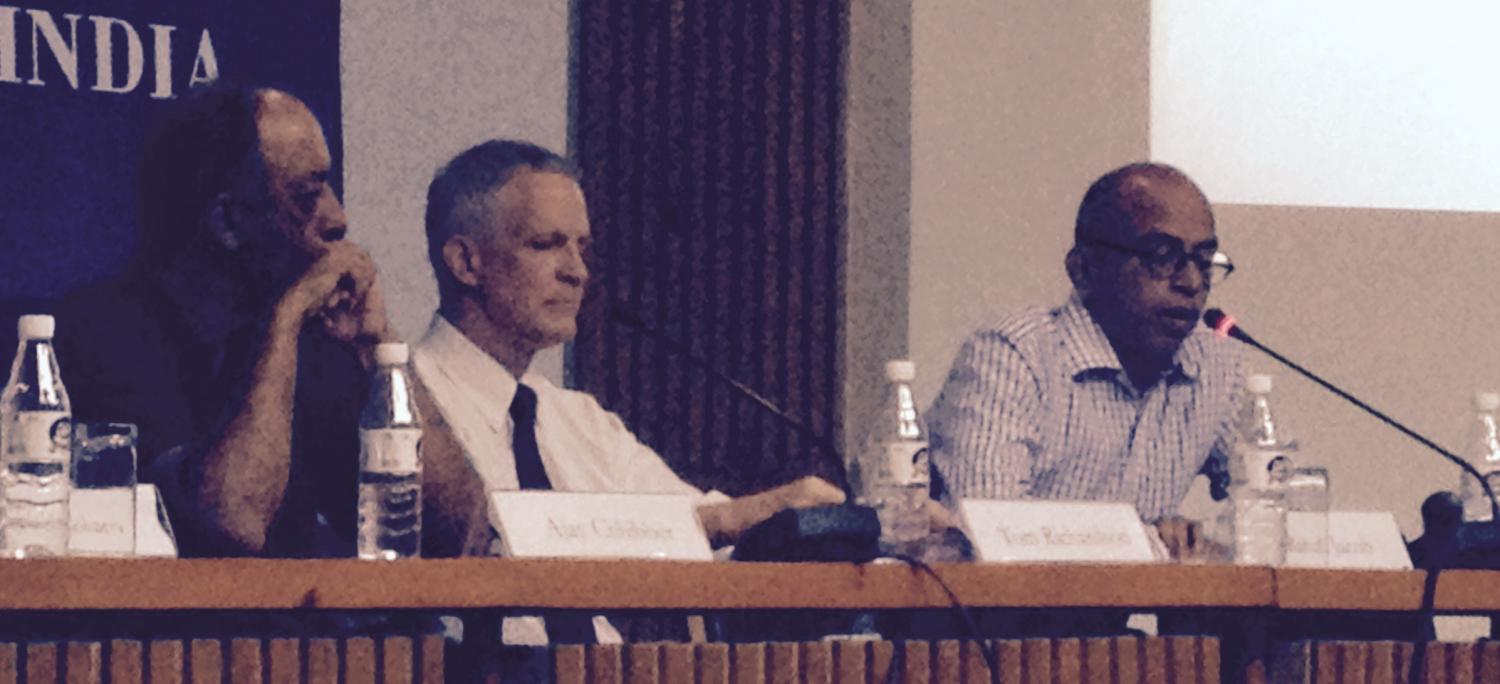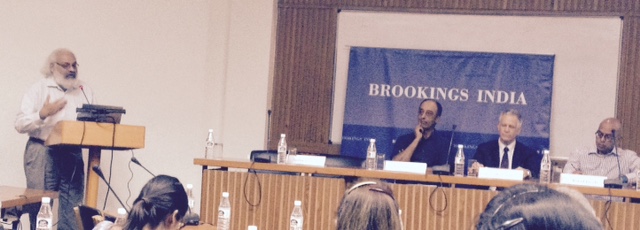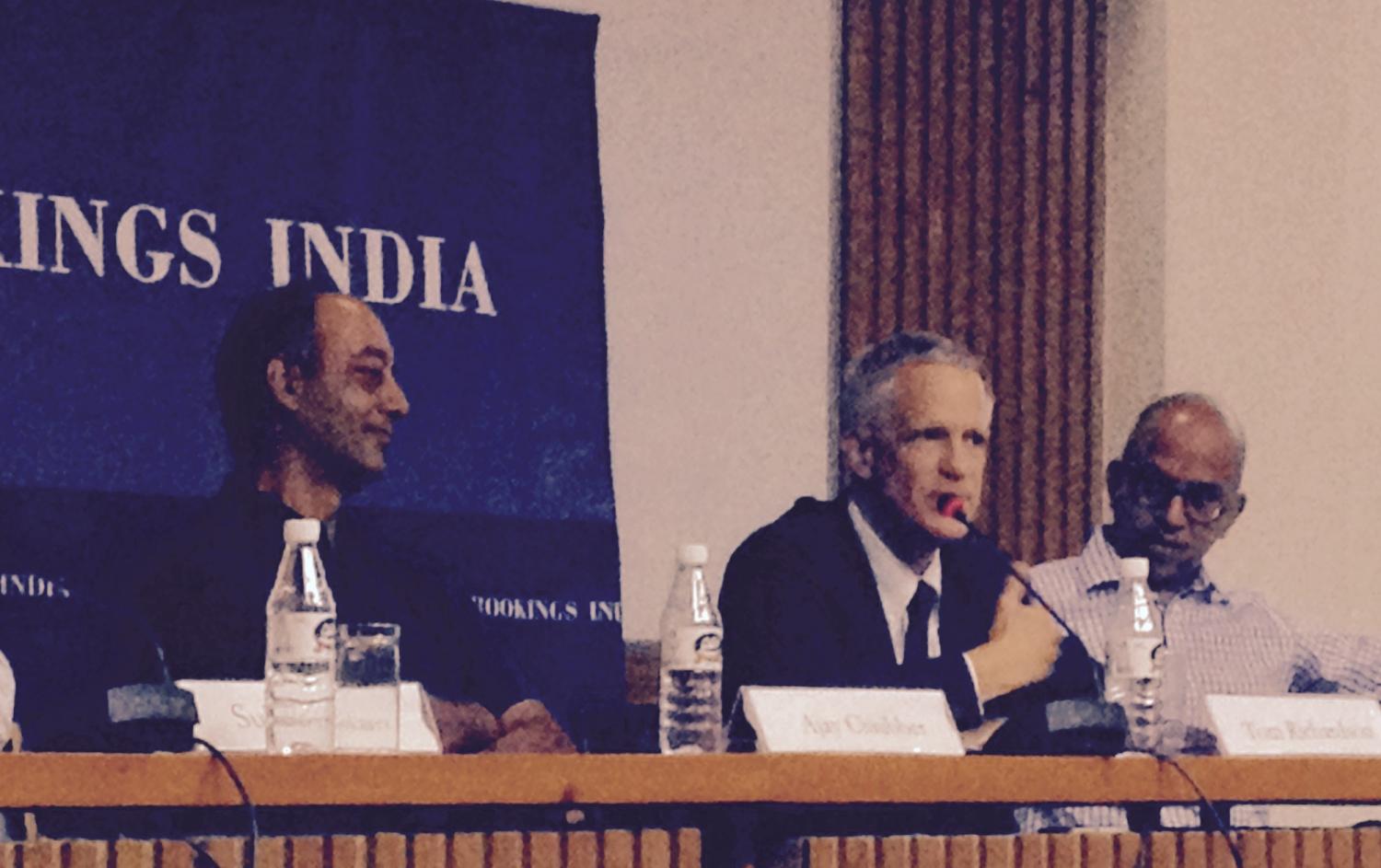

1:30 am IST - 3:30 am IST
Past Event
Content from the Brookings Institution India Center is now archived. After seven years of an impactful partnership, as of September 11, 2020, Brookings India is now the Centre for Social and Economic Progress, an independent public policy institution based in India.
Brookings India hosted a panel discussion on 11 September 2015 on “Recent developments in China and their Global Implications”. The panelists included Dr. Ajay Chhibber, Visiting Distinguished Professor at NIPFP; Dr. Thomas Richardson, Senior Resident Representative for India, Nepal and Bhutan, IMF; and Mr. Rahul Jacob, Managing Editor, Business Standard. The discussion was moderated by Dr. Subir Gokarn, Director of Research at Brookings India. The panel provided insights into the implications of China’s recent developments globally and in India, as well as its threat level and how to move forward.
Over the last few years, China has taken several actions that are suggestive of its quest for world domination. The Belt and Road Initiative, formerly known as the One Belt, One Road initiative, is a highly ambitious development strategy that enables Free Trade Agreements between China and 65 other countries. In addition, there are several institutions that create linkages between China and countries in Africa and Asia, such as the BRICS bank and the Asia Infrastructure Investment Bank. This evolving infrastructure mirrors the Bretton Woods system, and suggests that China is attempting to increase its role in global financial affairs.
However, the last six months have seen a sustained decline in China’s stock prices, as well as the depreciation of the Yuan. The response by the Chinese government to stabilize the economy has been weak, with seemingly short-term and knee-jerk reactions that may not be beneficial in the long run.
Dr. Ajay Chhibber led the discussion with a short presentation on “China’s transitions and India’s options,” emphasizing that the developments are part of a ‘correction’ rather than a ‘crisis’. The slowing growth rate in China can significantly impact commodity exporter countries because China is a sizable importer. The reasons for the sharp decline in the Chinese economy is the rapid rise in China’s debt, and its struggle with rebalancing of private consumption, government consumption and investment. However, despite India’s stock market taking a beating and the Rupee depreciating against the Yuan, the real effects on India have been minor. India is particularly weary of China’s Belt and Road Initiative because it includes a China-Pakistan Economic Corridor (CPEC) through Occupied Kashmir and is concerned about the series of infrastructure ports being built by China, which could have defense implications. Nonetheless, India has supported China in terms of financial institutions. Thus, India and China have a cooperative as well as a competitive relationship, with India carefully watching China’s actions.
Globally, the financial impact of the Chinese tremor is transitory. There has been a strategic shift to a slower, domestic consumption-led model of growth in China so as to avoid vulnerability of the economy. The corrections being made by the Chinese government are beneficial, so long as they are managed appropriately. The government should work hard to regulate the financial sector, ensure greater stability and get rebalancing right. The most important thing is that the Chinese government ensures that all its policies are well managed.
One theme emphasized by all the panelists was that the Chinese government’s mishandling of the situation in the past few months has led to the destruction of the perception that it was infallible. The administration had shambolic image management, given their lack of communication when the devaluation took place. Further, their repeated interventions in the stock market and encouragement of citizens to invest their savings in stocks was inappropriate and irresponsible.
The panelists concluded that the recent developments in China have been inevitable and strategic, and that the world may have overreacted to them. The reality of the situation is not as worrisome as it seems in the media, and that if they gradually and persistently work to get a hold of the situation, the economy will be back on track in no time.




Event Announcement
Recent events in China – a sustained decline in stock prices, followed by the depreciation of the yuan – have led to significant instability in global financial markets. This has not been helped by the perception that the Chinese policy response to these developments has been inadequate and ineffective. These developments are in stark contrast to the very ambitious strategy being developed by China to take on a pivotal role in the global trade and financial systems.
This, coupled with China’s long-term strategy have significant implications for the global economy in general and India in particular. The threats posed by recent events may be significant and warrant specific policy responses, but we need to take a wider view of the long term trajectory as well.
Brookings India is organising a panel discussion where we look into the implications, threat level, and the real reasons behind China’s policy response. We will attempt to provide answers to what India must do now as well as see what are the options and capacity for a collective response from the G-20 and multilateral institutions.
“Recent Developments in China and their Global Implications”
Date: Friday, September 11
Time: 3pm-5pm
Venue: Lecture Room I, Annexe, India International Centre (ground floor)
The panel discussion will be led off by Dr. Ajay Chhibber, Visiting Distinguished Professor at NIPFP and Visiting Scholar at the Institute for International Economics, Elliot School of International Affairs, George Washington University, Washington DC.
This will be followed by comments from Dr. Thomas Richardson, Senior Resident Representative for India, Nepal and Bhutan, International Monetary Fund and Mr. Rahul Jacob, Managing Editor, Business Standard.
Moderated by Brookings India Research Director Subir Gokarn.
The panelists’ comments will be followed by participant interaction.

Rahul Tongia, Anurag Sehgal, Puneet Kamboj
2020
Online Only
Tuesday, 4:00 am - 5:40 am IST

Saneet Chakradeo
August 18, 2020